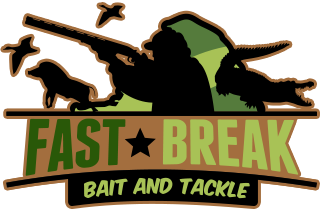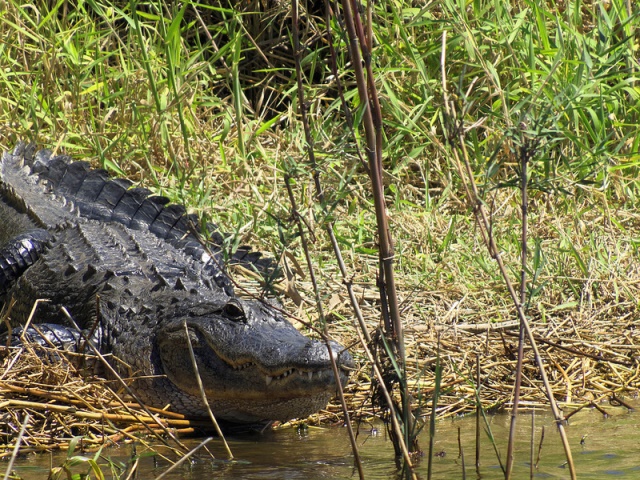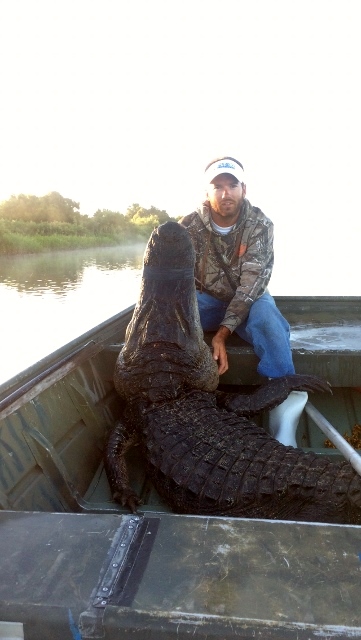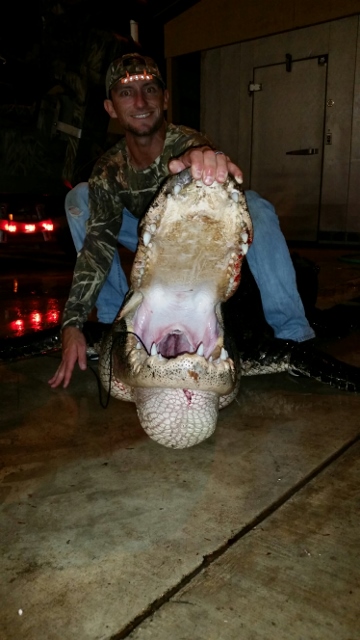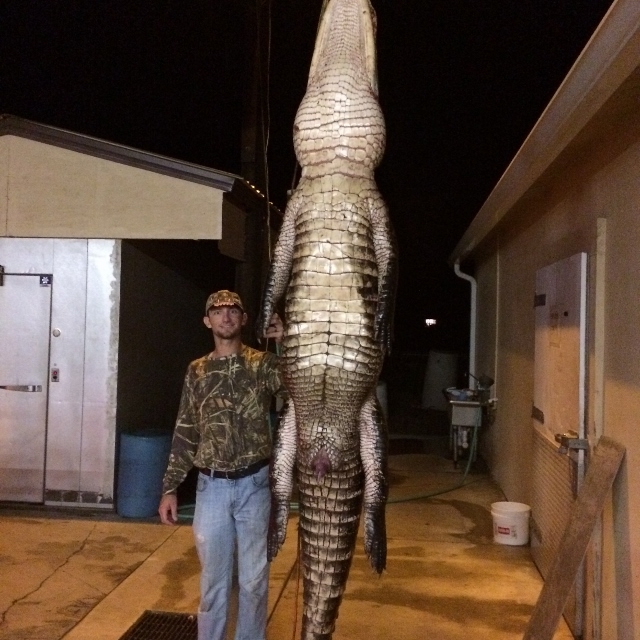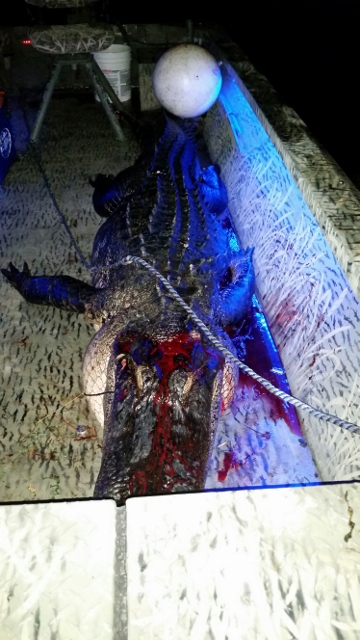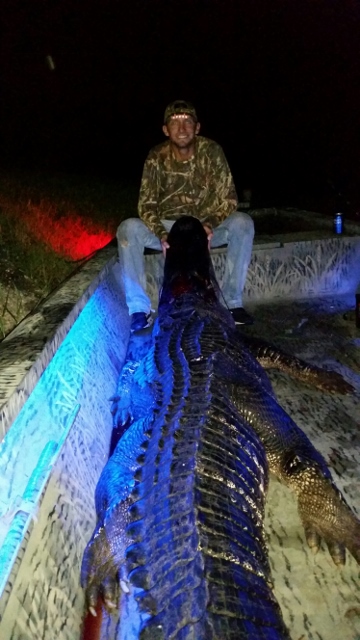Rate : Guide Provides Tag
- 9′ or Under – $1500
- 9′ to 11′ – $2000
- 11′ to 12′ – $2500
- Over 12′ – Call for price
This price includes guide service, boat, tags, transportation to and from the hunting location as well all necessary equipment needed to have a successful hunt. The price does not include alligator trapping agent license $52 per person. Trips are for 3 days of hunting or filled tags whichever comes first.
Rate : You Provide Tag
- $800 per night
Truly Wild Hunts
All of the alligator hunts will be on public land and truly free range. Don’t fall into the trap of booking with someone shooting a gator out of a pond. The first clue is if someone advertises year around gator hunts, these are private places with gators being harvested out of ponds.
Limited Hunts
The number of tags we have available for sale will vary from year to year as the tags are based on a lottery draw. We encourage anyone wanting to book a gator hunt to do so as early as possible because we will not hold a tag until a deposit is collected.
Season Dates
| Phase I | 5pm August 15 – 10am August 22 |
| Phase II | 5pm August 22 – 10am August 29 |
| Phase III | 5pm August 29 – 10am September 5 |
| Phase IV | 5pm September 5 – 10am September 12 |
| All Phases | 5pm September 12 – 10am November 1 |
Hunting Times
5 PM – 10 AM (Legal Hunting Hours)
Ready To Go Hunting? To Book A Guide Call 1-866-213-2474 or (863) 824-3474 or
Hunting Method
- Bow
- Cross Bow
- Fishing Pole
- Harpoon
Trip Length
The average hunt usually takes between 2 – 4 hours per tag. Hunting time can vary depending on several factors:
- Size of gator being hunted
- One tag or multiple tags being filled
- Location
What to Bring:
- Water/Snacks
- Camera
- Bug Spray
- Cooler (to take meat home in)
- Rain Coat
Accommodations
- Hampton Inn
1200 FL 70, Okeechobee, FL 34972
(863) 824-0003 - Travel Lodge
1527 SE 14th Terrace, Okeechobee, FL 34974
1 (800) 545-6343
Alligator Processing and Taxidermy
For alligator processing we use a local trusted processing facility called Florida Trophy Gators. With over 30 years of gator taxidermy and meat processing these guys know how to get it done. Customers have 3 different options:
“First, we will purchase your alligators outright. Because of the volatility of the market we cannot tell you exactly what your alligator will bring at this time, but I can promise top dollar”
“Second, we can process your alligator. We are a state licensed processing facility. We can process your alligator meat, or, if you’re in a hurry we can exchange your meat for fully processed, defatted, cubed and frozen vacuum sealed meat. You can swap your meat for your hide, swap your hide for your meat or just pay for processing”
“Third, we can mount your alligator. Anything from a simple head mount to a full body mount as a coffee table or an elaborate trophy mount for your trophy room”
***Courtesy of Florida Trophy Gators***
Deposit
Cancellation
Food Habits: Alligators are opportunistic feeders. Their diets include prey species that are abundant and easily accessible. Juvenile alligators eat primarily insects, amphibians, small fish, and other invertebrates. Adult alligators eat rough fish, snakes, turtles, small mammals, and birds.
Size: Female alligators rarely exceed 10 feet in length, but males can grow much larger. The Florida state record for length in 14 feet and 3(1/2) inches. The Florida record for weight is 1043 lbs.
Reproduction: Nearly all alligators become sexually mature by the time they reach approximately 7 feet in length although females can reach maturity at 6 feet. A female may require 10-15 years and a male 8-12 years to reach these lengths. Courtship begins in early April, and mating occurs in May or June. Females build a mound nest of soil, vegetation, or debris and deposit an average of 32 to 46 eggs in late June or early July. Incubation requires approximately 63-68 days, and hatching occurs from mid-August through early September.
Survival: About 1/3 of alligator nests are destroyed by predators (mainly raccoons) or flooding. The average clutch size of an alligator nest is 38. For nests that survive predators and flooding, an estimated 24 live hatchlings will emerge. Only 10 alligator hatchlings will live to one year. Of these yearlings, 8 will become subadults (reach 4 feet in length). The number of subadults that reach maturity (6 feet in length) is approximately 5. These estimates are for a growing alligator population. As a population matures (and has a higher percentage of large alligators), the survival rate would be expected to be lower, in part due to a higher rate of cannibalism.
Mortality: Eggs: Alligator eggs are susceptible to drowning, being crushed by the female, predation, and other less common calamities. Raccoons are the primary predator, although hogs, otters, and bears have been reported to depredate nests.
Juveniles: Small alligators are eaten by a variety of predators including raccoons, otters, wading birds, and fish; however, larger alligators may be their most significant predator.
Adults: Cannibalism, intraspecific fighting, and hunting by humans are probably the most significant mortality factors.
Diseases and Parasites: Very little information is available in the scientific literature on wild alligator diseases and parasites. They are not believed to be a significant problem for wild alligators.
Statewide Alligator Harvest Program: Since 1988, Florida’s statewide alligator harvest has been nationally and internationally recognized as a model program for the sustainable use of a natural resource. Each year, alligator management units are established with appropriate harvest quotas to provide recreational opportunities for Floridians and non-residents who are at least 18 years old to take up to 2 alligators per permit. Applicants who are awarded a permit must submit payment for two CITES tags and an Alligator Trapping License, or provide proof of possession of an Alligator Trapping License valid through the end of the alligator harvest season. A Florida hunting license is not required to participate in the statewide alligator hunt.
